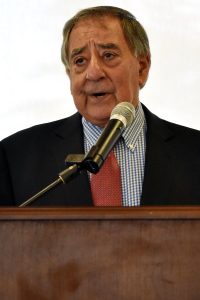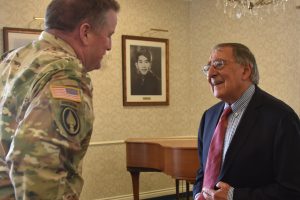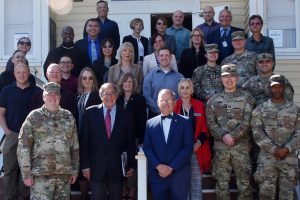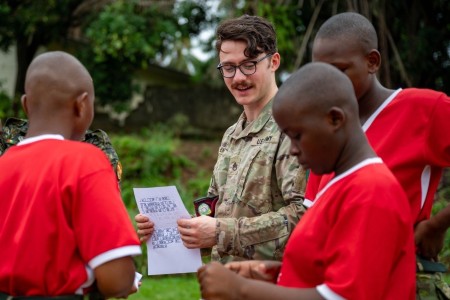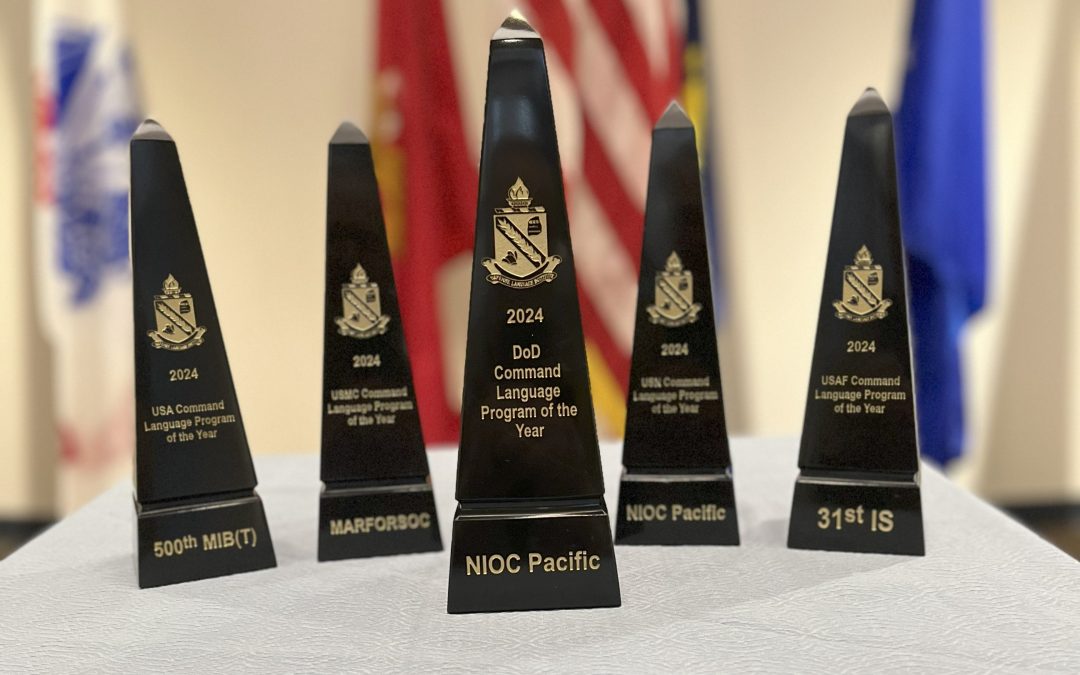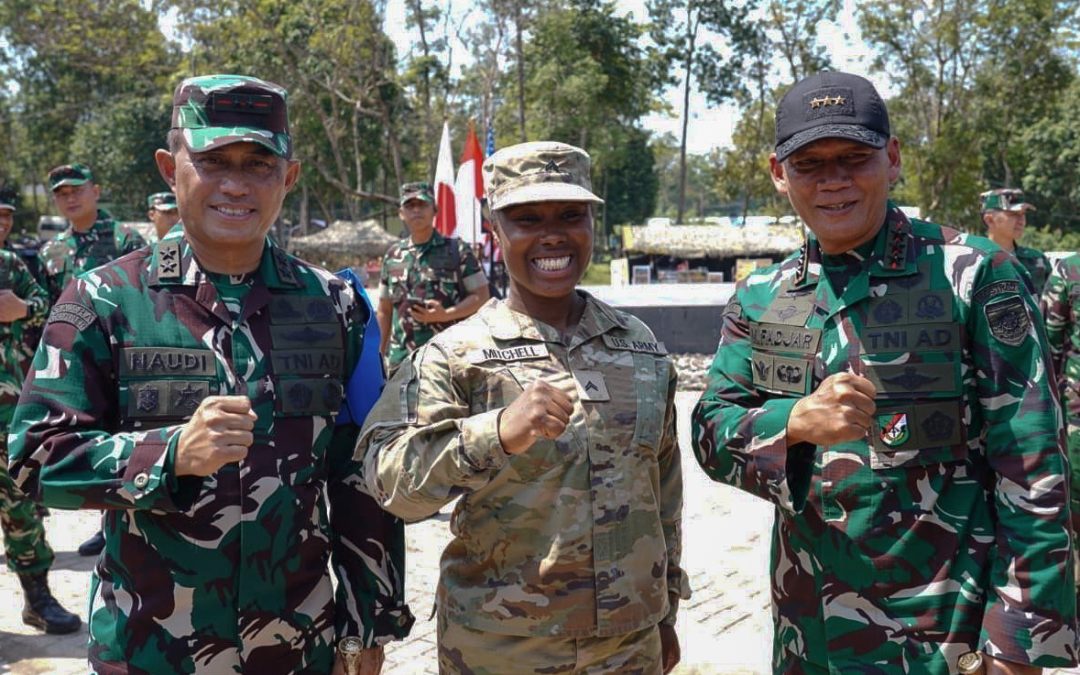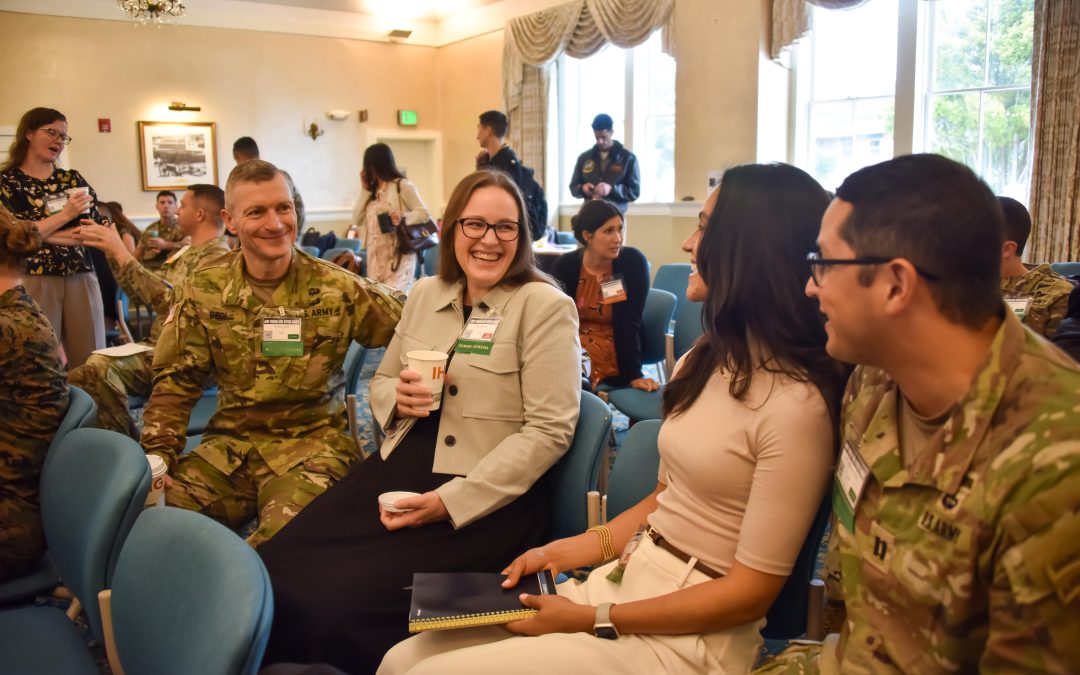If there was ever a championship fighter, a true Rocky Balboa, for the Defense Language Institute Foreign Language Center, you wouldn’t need to look any further than Leon E. Panetta.
“The Defense Language Institute [Foreign Language Center] is critical for our national security,” said Panetta, while attending a seminar organized by the Defense Threat Reduction Agency at the DLIFLC Monterey campus.
In a dual capacity, DTRA takes on a strategic role by reducing global weapons of mass destruction and emerging threats through deterrence, while simultaneously supporting key Department of Defense policies and priorities. They also assume an operational role by identifying, developing and fielding solutions to counter weapons of mass destruction and emerging threats, leveraging unique capabilities and expertise to directly support the Joint Staff and Combatant Command requirements. The focus of the training on Oct. 2, was, “Translation Unveils the Many Faces of Humanity.”
“As somebody who was born and raised in Monterey, I used to wander these grounds as a boy,” Panetta reminisced. “But it was when I was defense secretary and went to Iraq that I finally understood why the language training we give our soldiers is so important.”
While in Iraq, Panetta worked with a soldier who was interpreting for military units in-country and mentioned he’d been trained at DLIFLC.
“I suddenly realized this individual, in combat, who was interpreting for our benefit, was here so we could succeed in a military mission,” Panetta stated. “And that’s what DLIFLC is all about.”
Highlighting the pivotal role DLIFLC plays in national security, Panetta consistently championed the importance of language training to his colleagues. He underscored the necessity for the U.S. to comprehend the world and its place as a global leader and partner and the need to lead through communication and understanding.
Panetta commended DLIFLC for its ongoing enhancements in language instruction techniques, faculty development and technological integration. In his view, this unwavering commitment to excellence in language education has significantly bolstered the effectiveness of DLIFLC’s programs on the world’s stage. However, language training wasn’t always seen as such an asset.
“I was really worried,” Panetta admitted. “The problem in Washington is that when you look at priorities, education often gets a lower priority. There was this attitude if it’s not a tank, if it’s not a plane, if it’s not a ship, that somehow it could be sacrificed. And that’s just not true. DLIFLC performs a very important function. I have to tell you, we had to go through an education process in Washington to make them understand how important DLIFLC was to our ability to be able to fight a war.”
Language, often described as a form of “soft power” (referring to the ability to influence others without resorting to force or sanctions), has gained recognition for its profound impact on the inherent mission of the warfighter. It extends beyond mere translation, encompassing a profound comprehension of another nation’s culture, allowing troops to be more effective in the fields of cybersecurity, cryptography and interpretation.
Panetta emphasized the vital role of interpreters in international diplomacy, underscoring their ability to bridge language barriers and foster understanding among leaders from diverse nations. Drawing from his personal experiences as chief of staff for President Bill Clinton and as secretary of defense, he underscored the critical importance of skilled interpreters in the realm of successful diplomacy.
“The United States is a world leader. But what that means is that you’ve got to understand the world,” Panetta explained. “When the president of the United States or the secretary of state sit down with the leaders of other countries or their counterparts in other countries, you have to understand where they’re coming from. You have to understand what their needs are, what their concerns are, and having interpreters with the ability to convey those concerns can help develop a better relationship with that country.”
Panetta played a key role in protecting and professionalizing DLIFLC’s faculty. He drafted legislation to provide job security and training for instructors, ensuring that they could better serve the Institute’s mission.
“When I got elected, one of my priorities was to make sure that the military installations in the [Monterey] area were protected,” he explained. “The best way to do that was to make sure they had the facilities they needed to do the job, that we had the housing – that was important, to house the soldiers.”
Enhancing the facilities at DLIFLC, including housing, gym facilities, classrooms and technology infrastructure, was a top priority for Panetta. This underscores the significant impact these investments have had on creating a superior learning environment and advancing education.
Panetta boasts a remarkable career spanning decades of dedicated service. He began as a U.S. representative from California and ascended to key positions, including director of the CIA and the White House chief of staff during Clinton’s tenure. Notably, he orchestrated the operation that resulted in the capture of Osama bin Laden while leading the CIA and subsequently served as secretary of defense under President Barack Obama.
But it wasn’t until he hosted Chinese President Xi Jinping at the Pentagon and had a chance to sit down and really talk with him about very important and sensitive issues that Panetta really grasped the impact DLIFLC has made in the world.
“How do we deal with North Korea? How do we deal with trade? How do we deal with cyber issues?” Panetta questioned the Chinese leader. “How do we deal with other areas where we can work together to try to resolve these issues? The [Jinping] President said something I’ve never forgotten, which was ‘You’re right. If we could do that, we could advance peace and prosperity in the Pacific.’”
It was the event’s interpreters that made that pivotal conversation possible, explained Panetta.
“I really felt for the first time in dealing with President Xi that I could see the human side coming out. And it was very good interpreters who were able to explain just exactly the nuances of what he was saying. And that helped a lot.”

